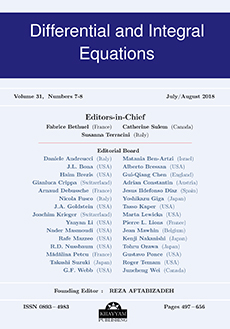Abstract
We study the asymptotic behavior near finite blow-up time $t = T$ of the solutions to the one-dimensional degenerate quasilinear parabolic equation $$ u_t = (u^\sigma u_x)_x + u^\beta \quad \text{in} \quad \mathbb{R} \times (0,T) ; \quad \sigma>0, \,\, 1<\beta<\sigma+1, $$ with bounded, nonnegative, compactly supported initial data. This parameter range corresponds to global blow-up where $ u(x,t) \to \infty$ as $t \to T^-$ for any $x \in \mathbb{R}$. We prove that the rescaled function $$ f(\xi,t) = (T-t)^{1/(\beta-1)} u(\xi(T-t)^m,t), \quad m = \frac {\beta-(\sigma+1)}{2(\beta-1)} < 0, $$ converges uniformly as $t \to T$ to a unique compactly supported, symmetric self-similar profile $\theta(\xi) \ge 0$ satisfying a nonlinear ordinary differential equation. The proof is based on the intersections comparison (the Sturmian argument) with a two-parametric family of self-similar solutions.
Citation
Victor A. Galaktionov. "Asymptotic self-similar global blow-up for a quasilinear heat equation." Differential Integral Equations 10 (3) 487 - 497, 1997. https://doi.org/10.57262/die/1367525664
Information





